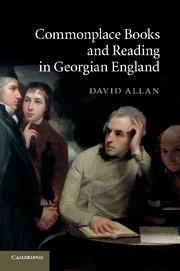Book contents
- Frontmatter
- Contents
- List of abbreviations
- Acknowledgements
- PROLEGOMENON
- PART I ORIGINS
- PART II FORM AND MATTER
- PART III READERS AND READING
- PART IV ANCIENT AND MODERN
- PART V TEXTS AND TASTES
- PART VI ANATOMISING THE SELF
- 14 The selfish narrator
- 15 Self-made news
- 16 Reading excursions: on being transported
- ENVOI
- Bibliography
- Index
15 - Self-made news
Published online by Cambridge University Press: 03 May 2011
- Frontmatter
- Contents
- List of abbreviations
- Acknowledgements
- PROLEGOMENON
- PART I ORIGINS
- PART II FORM AND MATTER
- PART III READERS AND READING
- PART IV ANCIENT AND MODERN
- PART V TEXTS AND TASTES
- PART VI ANATOMISING THE SELF
- 14 The selfish narrator
- 15 Self-made news
- 16 Reading excursions: on being transported
- ENVOI
- Bibliography
- Index
Summary
They have their Author-Character in view, and are always considering how this or that thought wou'd serve to compleat some Set of Contemplations, or furnish out the Common-Place-Book, from whence these treasur'd Riches are to flow in plenty on the necessitous World.
Lord Shaftesbury, Characteristicks (1714)Readers' experiences were integral to those definitively and definingly personal narratives that commonplacers constructed. Yet a willingness to combine them with evidence of close engagement with wider public events – out in what Shaftesbury had called ‘the necessitous World’ – was an important further dimension to self-identification. Partly this was because the dramatisation of a person's own life, lending it literariness through textualisation and narratisation, inevitably benefited from establishing a convincing context: a player, as we might say, requires both a stage and a company of fellow thespians before the plot, and his or her unique character, can be adequately revealed. At the same time, however, the relationship between diary-keeping, commonplacing and reading was also affected by the newspapers and other periodicals increasingly constituting the quotidian diet of the Georgian reader. Above all, this had consequences for how individuals understood their own membership of communities, encouraging note-takers in particular to attach heightened significance to records of events in society at large – in short, to the ‘news’ that print journalism continually purveyed. From certain views, indeed, it may even have begun to seem that the commonplace book, at first literally a tabula rasa but easy to fill to overflowing, now also offered an irresistible temptation for the reader to become his or her own journalist.
- Type
- Chapter
- Information
- Commonplace Books and Reading in Georgian England , pp. 226 - 236Publisher: Cambridge University PressPrint publication year: 2010



